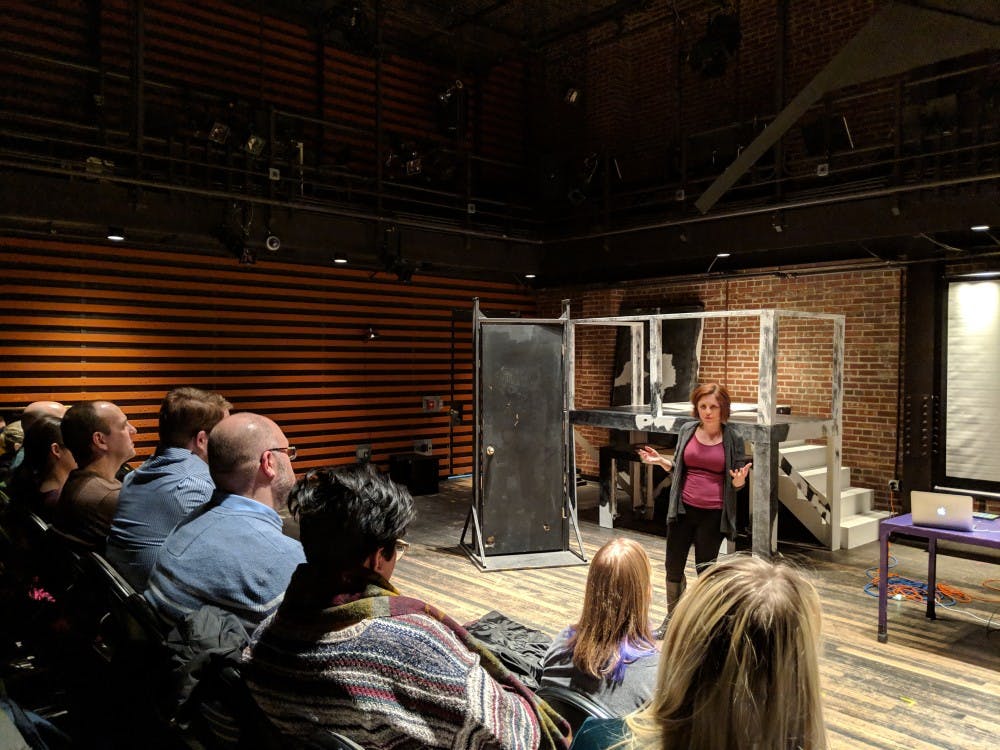Guest lecturer Kelly Howe led “Rehearsal for the Revolution” on Thursday afternoon in the Studio Theatre.
The lecture explored what defines the Theatre of the Oppressed, or TO.
Central to the development of the TO is Brazilian thespian, theorist and activist Augusto Boal, Howe said. As a thespian tortured and exiled under Brazil’s oppressive regime in 1964, Boal became interested in how he could perform theater while calling attention to oppression in his own life and community.
Among the forms of theater Boal developed is Forum theatre. In Forum theatre, a play dealing with a particular form of oppression runs once. Then, it immediately is performed a second time.
During the second run, if an audience member empathizes with a particular moment of oppression on stage, they can shout “stop” and takes the place of the actor. The play continues in whatever direction the spectator chooses.
This democratization of theater is a focal point of Boal’s TO. His idea of destroying the actor-spectator hierarchy is embodied in a term he coined: “spect-actor.”
“He wanted, as much as possible, to have environments where there were not artists and non-artists,” Howe said. “But, there were spect-actors working together, using theater as a means to analyze oppressions for the purposes of dismantling them.”
Spect-actors who come on stage might try a particular tactic or response to the form of oppression being imposed on them, Howe said. Forum theatre features a facilitator, called the “Joker” or "difficultator," who then stops the play after a few minutes and engages the audience in a conversation about what they saw.
“The most politically efficacious form of theater we could have, in Boal’s opinion, is if everyone in the room were all spect-actors, rather than having the division of labor marked by calling some people artists and others not,” Howe said.
One of Boal’s forms of TO, Newspaper theatre, is a system of techniques to stage stories from newspapers and other written pieces, Howe said. The idea was to promote awareness of current events, thereby promoting activism.
“Boal said even a news story that might be presented with technically correct facts becomes a work of fiction when it is published in the service of the dominant class,” Howe said.
Legislative theatre came about when Boal became a city council member, or Vereador, in Rio de Janeiro. Boal hired actors and theater people for his staff who would work with various communities.
These communities could then act out their issues, opinions and concerns in a theatrical manner.
About 13 laws were created through Legislative theatre during Boal's government, according to the Arte Útil website.
In violent, oppressive regimes, Invisible theatre is acted out in public spaces not recognized as a theater, such as a street or shopping center. Actors would perform without letting spectators know it was staged.
“It would be a way of disturbing public space and getting people to think about a topic, and even investigating how people respond to it,” Howe said.
Howe spoke about why such a form of theater was important. Cecilia Boal, Augusto Boal’s wife, was an actress under the Brazilian military dictatorship between 1964 and 1985.
“A grenade hit the boards of the stage that she was performing on,” Howe said. “The joke she always makes is, ‘Thankfully, it was a Brazilian grenade, so it didn’t go off.’”
Regardless of the form, TO wants to share the means of making theater with oppressed people, Howe said. These people don’t need artists to tell them what to do with their lives.
“They are the authorities and experts of their lives,” Howe said. “They have the expertise of their lived experience, and they know their lives. Let’s use theater to explore that.”




